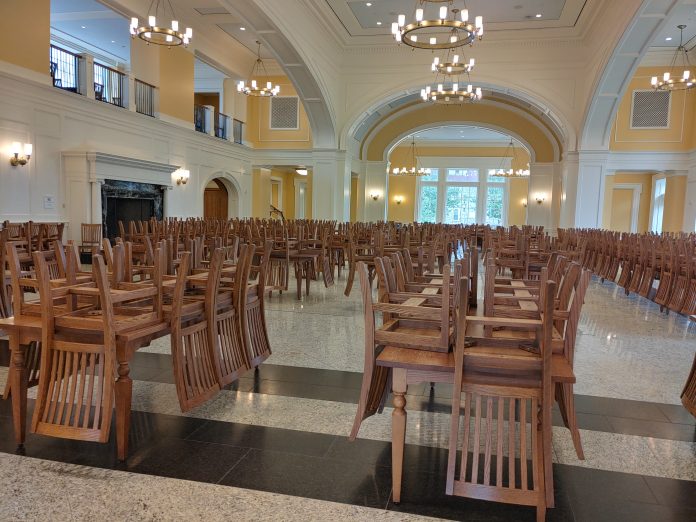
DePauw students know Hoover as their dining hall, but many do not know the building beyond its house brick pizza or late night fries. What lies below the main dining hall? The answer … pickles!
“The basement of Hoover is pretty much where all the food production happens. There is a lot going on and pickle fermentation happens to be one of those things,” Lauren Fornari, executive chef, explains.
When Fornari started working at DePauw in 2017, she brought her background in fermentation with her. Previously, she served at Wabash College and worked with other accounts through Bon Appetit, pickling cucumbers and jalapeños. Once she tried her hand at this fermentation process, she began pickling other foods as well. All of the vegetables pickled in the basement are served on the food lines in the cafe, including jalapeños, sauerkraut, hot sauce, kimchi, and of course—pickles.
The process is unique for each dish, but they all use a mixture of lactic acid, sugar, and salt. Once the vegetables are soaked, they can take anywhere from a couple days to a whole month to complete their pickling process. Hot sauce is the longest of the processes, taking upwards of six weeks to make, while cucumbers only take about five days.
Fornari has always been happiest making food for others. “I love the way these foods can make people feel. Food can completely change someone's day, it can bring their spirits up when they eat something close to home,” she said.
Fornari’s skills go hand-in-hand with Bon Appetit’s approach to food production. Bon Appetit is committed to giving students a healthy lifestyle experience, leading by example and embodying their definition of sustainability:
A sustainable future for food service means flavorful food that’s healthy and economically viable for all, produced through practices that respect farmers, workers, and animals; nourish the community; and replenish our shared natural resources for future generations. —Bon Appétit Management Company’s definition of sustainability
Bon Appetit has served at DePauw for eight years. Their company is passionate about making dishes that optimize both personal health and the planet. The food served aims to use 20% of local produce in a 150 miles radius from farm to door. Currently, DePauw exceeds this goal, sitting at around 30% with help from the campus farm.
Senior Lexie Manor appreciates the time and effort put into this process. As a senior, she does not have the opportunity to eat at Hoover as often as she once could, but she recalls pleasant experiences.
“When I was a first-year and first ate at Hoover, my mom and I immediately raved about the pickles, we could tell they were freshly made,” she said.
She was pleasantly surprised to learn that the pickles are fermented right below the dining hall and shared her mom’s genuine excitement when she visits DePauw because of the homemade pickles waiting at Hoover. Manor believes that students often take for granted the effort involved in food production.
First-year Mikie Wittman agrees. He expressed his gratitude for the workers who care about their students as individuals, both physically and mentally. A balanced and sustainable meal is something he does not take for granted.
“Everything is always fresh from the local farm and it definitely shows. I think we are lucky to have Hoover as our dining hall because I can always try something new and I appreciate that it is homemade,” Wittman said.
The basement of Hoover is the working grounds for the products in the dining hall that students experience. Without the effort of the individuals involved in the process, the lactic acid for the cucumbers, and Laura Fornari’s fermentation skills, none of this would be made possible. It is safe to say that the basement of Hoover is a pretty big “dill.”
